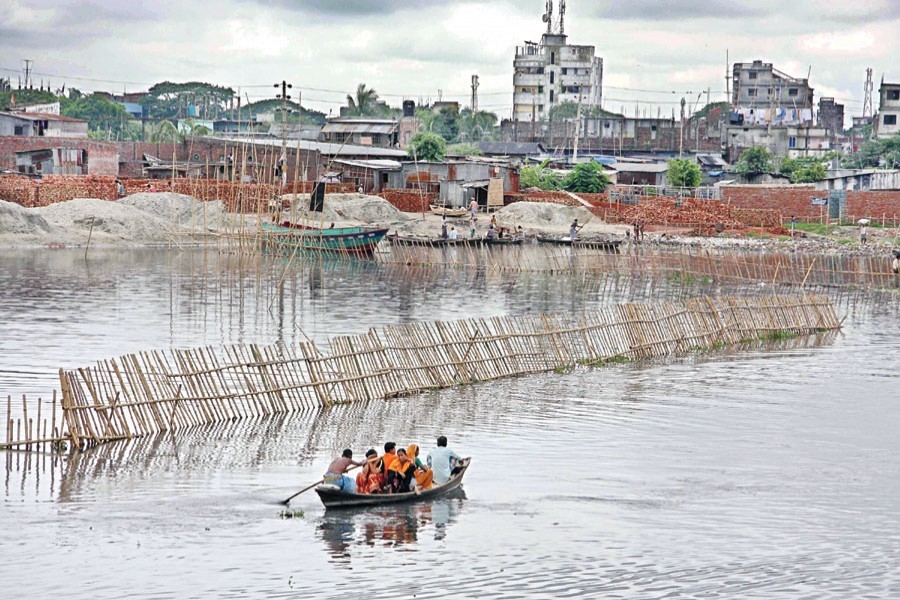The High Court last Sunday, in a most comprehensive landmark judgment, ordered a stringent set of measures against the river grabbers in the country. Demonstrating judicial activism for public good, the court has directed the Election Commission to debar individuals 'accused' of encroaching on rivers from contesting any election including the parliamentary one. Equally forceful but with a wider implication is a directive to Bangladesh Bank not to provide any loan to river grabbers. Almost all of the 450 rivers of Bangladesh have been encroached upon in degrees, but none more than the five dying rivers of Dhaka -- Buriganga, Balu, Turag, Shitalakkhya and Dhaleshwari which were once the lifeline of the city.
In breach of a 2009 landmark HC (High Court) judgment ordering measures like demolition of illegal structures along and into rivers and demarcation of river boundaries, a wicked ploy was applied to circumvent full compliance: Demarcation pillars were pitched along the riverbanks during the lean flow of the dry season excluding 2,500 acres of foreshores and wetlands of the five rivers to extend a sway on the waterline in the monsoons. Eviction efforts in fits and starts floundered on the rock of evictees returning to occupy river space hot on the heels of eviction.
Protection and conservation of rivers is key to rejuvenating environment for good health, navigation, investment, marketing and economic activities. The harsher measures ordained by the HC to protect rivers require an amendment to the National River Protection Commission (NRPC) Act 2013 with enabling provisions for punishment. It is not surprising that the current NRPC act has proved toothless against the machinations of individuals who work through powerful nexus. Legislation alone, however, cannot keep the greedy land grabbers at bay. Political will, social mobilisation for resistance and application of a law with teeth can help end the impunity culture. In order for the Election Commission and the Central Bank not to allow even persons 'accused' of river encroachment to contest election and receive bank loans would necessitate a special provision. An 'accused' may enter a plea that until conviction, he or she can't be barred from candidacy or bank loan. The point is speculative at this stage until the amendment is tabled on the floor of the House triggering a scrutiny including in public domain. However, the emphasis on prospective denial of bank loans to the offenders tends to hit the nail on its head because land grabbers are eager to take bank loans aiming to spend it in so-called real estate (read ill-gotten estate!) development projects. Then they will probably account for more non-performing loans (NPLs). Thus, with loan default and the proposed ante-dote of a ban on bank lending to river encroachers the space should shrink for those who nurse political ambition riding a rough-shod on society.
What is pivotal to the whole exercise is the release of a list of those who have encroached on water bodies and built illegal constructions thereon. It must be updated and made public to expose them and then after a thorough investigation hold the guilty to account. It is imperative to develop a digital data base of the country's water bodies through satellite imageries and on-ground corroboration. Only then will the government with the help of a task force comprising experts in public and private sectors be able to earmark the total areas under illegal occupation and proceed to restore them to state control. The Election Commission and the Bangladesh Bank need updated lists of encroachers of water bodies to enforce the bans.


